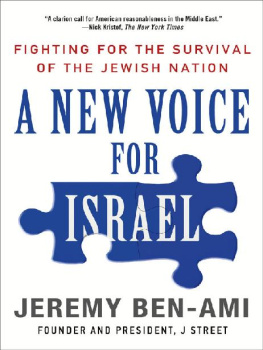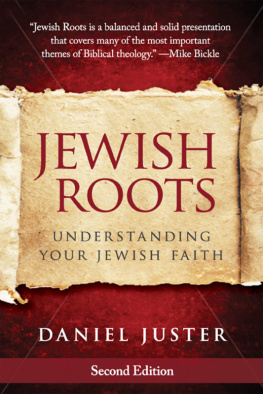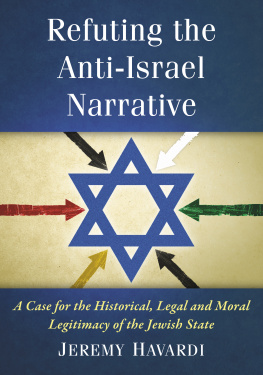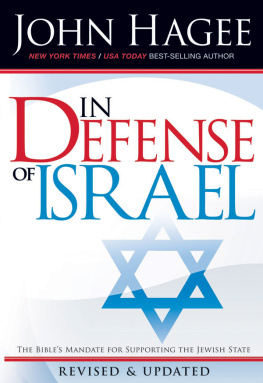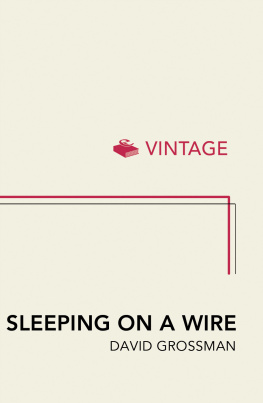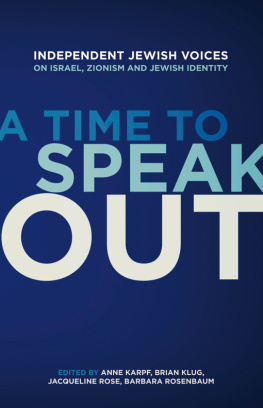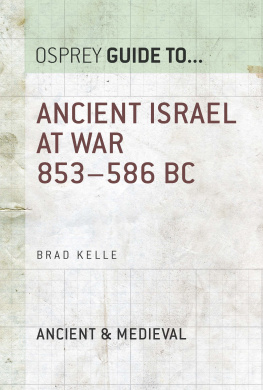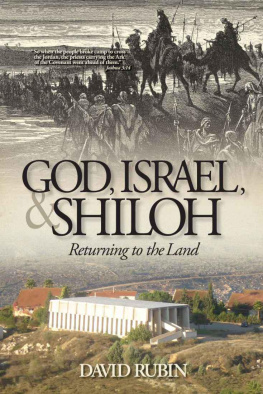A NEW
VOICE
for
ISRAEL
A NEW
VOICE
for
ISRAEL
FIGHTING FOR THE SURVIVAL OF THE JEWISH NATION
JEREMY BEN-AMI
The author and publisher have provided this e-book to you for your personal use only. You may not make this e-book publicly available in any way. Copyright infringement is against the law. If you believe the copy of this e-book you are reading infringes on the authors copyright, please notify the publisher at: us.macmillanusa.com/piracy.
For my partner, Alisa,
and for the next generation, Shira and Ari
CONTENTS
THE PIONEERS AND THE BUILDERS
THE FIGHTERS
BORN IN THE USA
SIXTY SECONDS IN SANTA FE
THE LOUDEST EIGHT PERCENT
ENDING THE CONFLICT
THE CROSSROADS OF POLITICS AND POLICY ON ISRAEL
GENERATION OY!
FIVE MILLION JEWS, ONE OPINION?
REWRITING THE RULES
WHAT BECOMES OF TEL AVIV IN 2109?
AMERICAS STAKE IN ENDING THE CONFLICT
GIVING VOICE TO OUR VALUES
WHY NOT?
ACKNOWLEDGMENTS
A bout two years ago, my father-in-law called to suggest that I write a book about J Street and what led to this new effort to change the American conversation on Israel in the United States. I told him there was no way I could do it without putting way too much strain on all those around me, from family to colleagues. He assured me that everyone would do their part to helpand he was right.
This book wouldnt have been possible without the assistance of my colleagues, family and friends. Two of J Streets staff assistants, Sarah Turbow and Jeremy Sherer, helped with months of research. My colleagues Dan Kohl, Rachel Lerner, Carinne Luck, Isaac Luria and Hadar Susskind were kind enough to read early drafts. Others in and around J Street provided important feedback, including Jim Gerstein, Matt Dorf and Janette Hillis-Jaffe. I owe a special thanks to Daniel Levy, my partner in launching J Street, a constant source of intellectual inspiration and challenge and the person whose thinking has most deeply influenced my work and this book.
J Street itself wouldnt be possible without the leadership and support of many peopleadvisers, funders and activists. However, there are a few whose support stands out as essential to everything were achieving: Bill Benter, Davidi Gilo, Mort Halperin, Victor Kovner, Kathleen Peratis, Deborah Sagner, Alan Sagner and Alexandra Stanton. Our work is only possible in partnership with a number of other terrific leaders and organizations with whom we work closely, including Debra DeLee and her team at Americans for Peace Now and Daniel Sokatch and his colleagues at the New Israel Fund.
I am grateful that a broader circle of friends and associates agreed to read some or all of the book, including Deborah Lewis, Gabrielle and David Fitzgerald, Alan Snitow and Deborah Kaufman, Rabbi Jonathan Roos, Steven M. Cohen and Rafael Medoff. And I know there would be no book without my editor, Emily Carleton, who reached out on her own initiative to express interest in the project, and my agent, Priscilla Gilman, who guided me through the unfamiliar waters of bringing a book idea to fruition.
But the biggest thank-you goes, of course, to my family. My mother-in-law, Paula Biran, gave the project the thorough read it needed and caught every mistake that I had overlooked. After all, thats what mothers-in-law are for, and Im so grateful for her time and caring. My father-in-law, Ephraim Biran, lived much of the history recounted in the book, from Petah Tikva to the Upper West Side of Manhattan. He was kind enough to read it and give me his feedback and his approval. My sister, Debbie Benami-Rahm, is a powerful source of encouragement in all that I do, and, of course, there wasnt a moment when I was working on this book that my father and mother were not with me in spirit. Their inspiration guides me every day.
My wife, Alisa, made not only this book but really the entire J Street effort possible. She was the first to suggest, nearly a decade ago, that if I found the politics of the Jewish community on Israel so disturbing, then I should stop complaining and do something about it. And she has carried far more of the weight in our parenting partnership, particularly during the months when this book was in the works and I needed time away to write. I love her and cherish our friendship.
In the end, I am inspired and fired up to do the work that I do by my wonderful children, Shira and Ari, who embody a delight in what is good in life that should focus all those in positions of power on the imperative to end conflicts and build a future deserving of their faith in us as parents.
INTRODUCTION
T en or fifteen years ago, I believed that the arc of conflict involving Israel in the Middle East, though long, ultimately bent toward peace.
Time was on the side of the peace makers. First, Anwar Sadat came to Jerusalem, paving the way for compromise with Egypt. Then there were historic handshakes on the White House lawn hosted by President Bill Clinton. Next, peace with Jordan.
True, terror attacks and assassinations occasionally marred the path to peace, but Martin Luther King had warned that, on the road to justice, There will still be rocky places of frustration and meandering points of bewilderment. There will be inevitable setbacks here and there. And there will be those moments when the buoyancy of hope will be transformed into the fatigue of despair.
We almost made it. Syria and Israel came within a few hundred meters of resolving their dispute. And Israelis and Palestinians flirted on several occasions with meaningful compromise. All we needed, it seemed, was a different mix of leaders and a dose of courage, and we could get it done.
Today, sadly, time seems to have switched sides, and the arc is bending in the wrong direction. Ideologies are becoming more extreme, gaps between the parties wider, and the technology for killing and destruction ever-more sophisticated.
If things dont change pretty soon, chances are that the two-state solution to the Israeli-Palestinian conflict will slip through our fingers. As that happens, the dream of the Jewish people to be a free people in their own land also slowly disappears.
There will not be one winner in the Israeli-Palestinian conflict. There can be only a win-win compromise or a perpetual, bloody conflict.
For too long, Israel advocacy in the United States has ignored this reality. Pro-Israel advocates have filtered discussion of the Middle East conflict through only one lensa simple us-versus-them formulation that demands unquestioning support for Israel. Politicians, community leaders, media and academics have been told youre either with Israel or against it, while the Jewish community has turned a blind eye to the moral and ethical implications of occupation and its impact on both the Palestinian people and Israel itself.
On the surface, this kind of advocacy appears to serve the State of Israel well. Its resulted in a generous aid package, the patronage of the worlds only superpower and absolute loyalty from friends and family abroad.
However, it has also abetted the failure to resolve the conflict by enabling Israel to avoid taking the tough but necessary steps to end it. And it has had a poisonous impact on the American Jewish community, where debate is stifled and criticism of Israeli policy unwelcome.
In 2008, together with other passionate supporters of Israel, I helped start J Street to give a voice in American politics to those who believe that Israels future depends on a two-state solution. Believing that active American diplomacy is essential to ending the conflict, our core mission is to change the political dynamics that prevent its resolution, while opening up greater space for debate and discussion on Israel in the Jewish community.


